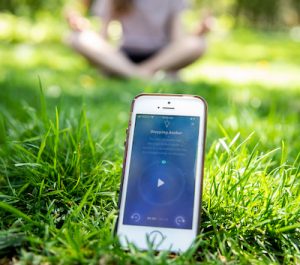By Laurel White
Smartphone-based apps focused on meditation training and practice have grown fast and engaged millions of users around the world over the past decade — but there are several ways they could be even more effective supports of mental health, according to a new study co-authored by a School of Education faculty member.
The study, recently published in the journal American Psychologist, argues continued scientific study and thoughtful expansion of apps’ offerings could improve mental health across the globe. Simon Goldberg, an associate professor in the School of Education’s Department of Counseling Psychology and core faculty member at the Center for Healthy Minds, co-authored the analysis.

“This digital meditation app revolution presents both opportunities and challenges,” Goldberg says. “These apps can be powerful tools for well-being, but arguably deserve to be studied with the same scientific rigor historically applied to our other evidence-based behavioral health interventions.”
Goldberg co-authored the study with J. David Creswell, a health psychologist at Carnegie Mellon University.
The study offers a review of the apps’ introduction and growth, as well as a synthesis of scientific research on their usage, efficacy, and safety.
Meditation apps appeared on the commercial stage in the late 2010s with the launch of the now-popular apps Calm and Headspace. Those two products were not alone in the market — more than 2,500 meditation apps were introduced between 2015 and 2020, the study notes.
Goldberg and Creswell also note a growing body of research has found the apps produce “modest but consistent reductions in depression and anxiety” for routine users.
“Initial mechanistic studies further suggest that improvements in worry, repetitive negative thinking, and self-reported mindfulness skills may underpin these effects, alongside early findings on blood pressure reduction and pro-inflammatory gene expression,” they wrote.

However, the analysis also points out the apps struggle to retain 95% of users past 30 days and lack the benefits of in-person interpersonal support, personalization, and robust policies related to privacy and large-scale data capture to inform scientific understanding.
In a story published by Carnegie Mellon University, Creswell argued the study was the first to lay out “the new normal” and to “challenge researchers and tech developers to think in new ways about the disruptive nature of these apps and their reach.”
“People are suffering right now,” Creswell said. “There are just unbelievably high levels of stress and loneliness in the world, and these tools have tremendous potential to help.”
Creswell and Goldberg urge additional, robust research on how meditation apps are used and how they could be best deployed to support mental health.
“With so many millions of people turning to these apps across the globe, there is time urgency to scientific research in this area,” they wrote.
Broadly, Goldberg’s research focuses on the effects of and mechanisms underlying meditation- and mindfulness-based interventions in psychotherapy. He is currently leading a five-year project funded by the National Institutes of Health to increase scientific understanding of alternative health treatments including mindfulness, acupuncture, and chiropractic care. He has also recently begun a four-year project funded by the National Institutes of Health investigating the impact of adding human coaching alongside the use of the Healthy Minds Program, an app created by the Center for Healthy Minds’ partner non-profit Healthy Minds Innovations.
The full study recently published in American Psychologist, “The Meditation App Revolution,” is available online.